This article was co-authored by Damaris Vega, MD. Dr. Damaris Vega is a board certified Endocrinologist. She graduated Magna Cum Laude from the Pontifical Catholic University of Puerto Rico with a BS in General Science and subsequently earned an MD from the Ponce School of Medicine, Ponce, PR. During medical school, Dr. Vega served as president of the Alpha Omega Alpha Medical Honor Society and was selected as her school's representative for the American Association of Medical Colleges. She then completed a residency in Internal Medicine and a fellowship in Endocrinology, Diabetes, Mineral, and Metabolism at The University of Texas Southwestern Medical School. Dr. Vega has been recognized for excellent patient care multiple times by the National Committee for Quality Assurance and received the Patients' Choice Award in 2008, 2009, and 2015. She is a fellow of the American College of Clinical Endocrinologists and is an active member of the American Association of Clinical Endocrinologists, the American Diabetes Association, and the Endocrine Society. Dr. Vega is also the founder and CEO of Houston Endocrinology Center as well as a principal investigator for multiple clinical trials at Juno Research, LLC.
There are 16 references cited in this article, which can be found at the bottom of the page.
wikiHow marks an article as reader-approved once it receives enough positive feedback. This article received 16 testimonials and 86% of readers who voted found it helpful, earning it our reader-approved status.
This article has been viewed 312,992 times.
A goiter is an abnormal enlargement of the thyroid gland.[1] The thyroid is a butterfly-shaped gland found in your neck, just below the Adam's apple. While some goiters are painless, they can become big enough to cause a cough, sore throat, and/or breathing problems. A variety of underlying conditions can cause goiters to develop. There are many treatment options that are recommended to treat goiters depending on their cause and severity.
Steps
Diagnosing a Goiter
-
1Learn about goiters. To diagnose and then treat a goiter, you must first learn what a goiter is. A goiter is an abnormal, but usually benign, growth in the thyroid gland. This may be associated with normal, decreased, or increased thyroid production.[2]
- Goiters are usually painless, but they can cause coughs, breathing problems, difficulty swallowing, diaphragm paralysis, or superior vena cava (SVC) syndrome.
- Treatment depends on the size of your goiter and symptoms, as well as the reasons the goiter developed.[3]
-
2Know the symptoms of a goiter. To figure out if you may have a goiter, know the symptoms. If you're experiencing any of the following, you should make a visit to your primary care doctor for an official diagnosis:[4]
- A visible swelling the base of your neck, which may be very obvious when you shave or put on makeup
- A tight feeling in your throat
- Coughing
- Hoarseness
- Difficulty swallowing
- Difficulty breathing
Advertisement -
3Prepare for your appointment. As goiters are somewhat nebulous medical conditions — they can be caused by a number of conditions and there are a variety of options for treatment —come in with a list of questions. Questions should include:
- What is causing this goiter?
- Is it serious?
- How should I treat its underlying causes?
- Are there any alternative treatments I can try?
- Can I use a watch and wait approach?
- Will the goiter get bigger?
- Will I have to take medication? If so, for how long?
-
4Visit your physician. Your doctor will perform a variety of tests to diagnose a goiter. These tests depend on your medical history and what the doctor suspects is causing the goiter.[5]
- Your doctor may perform a hormone test to see the amounts of hormones produced by your thyroid and pituitary gland. If the levels are too low or too high, this is likely the cause of the goiter. Blood will be drawn and sent to a lab.
- An antibody test might be performed, as abnormal antibodies can cause goiters. This is done through blood tests.
- In ultrasonography, a device is held over your neck and sound waves from your neck and back form images on the computer screen. Abnormalities that cause goiters can be identified.
- A thyroid scan might also be performed. A radioactive isotope is injected into the vein in your elbow and you then lie on the table. A camera produces images of your thyroid on a computer screen, providing information about what's causing the goiter.
- A biopsy may be performed, usually used to rule out cancer, in which tissues is drawn from your thyroid for testing.
Seeking Medical Treatments
-
1Use radioactive iodine to shrink the enlarged thyroid gland. In some cases, radioactive iodine can be used to treat an enlarged thyroid gland.[6]
- The iodine is taken orally and reaches the thyroid gland through your bloodstream, destroying thyroid cells. This treatment option is common in Europe, and its usage dates back to the 1990's.
- The treatment is effective in that 90% of patients have a 50 – 60% reduction in goiter size and volume after 12 to 18 months.[7]
- This treatment can result in an underactive thyroid gland, but such an issue is rare and usually shows up in the first two weeks after treatment. If you're concerned about the risk, talk this option over with your doctor beforehand.[8]
-
2Use medications. If you're diagnosed with hypothyroidism, that is an underactive thyroid, medications will be prescribed to treat the condition.[9]
- Thyroid hormone replacements, such as Synthroid and Levothroid, help with symptoms of hypothyroidism. This also slows the release of hormones from your pituitary gland, a compensatory response of your body, which may decrease goiter size.[10]
- If your goiter does not decrease with hormone replacements, you will still stay on the medication to treat other symptoms. However, your doctor might suggest aspirin or a corticosteroid cream.[11]
- Thyroid replacement hormones are usually well tolerated in patients, but some side effects can occur. Side effects may include chest pain, increased heart rate, sweating, headaches, insomnia, diarrhea, nausea, and irregular menstrual cycles.[12]
-
3Consider surgery. The goiter can be removed surgically.[13] A 3 to 4 inch (7.6 to 10 cm) cut will be made in the middle of your neck, on top of the thyroid gland, and all or part of the thyroid is removed. The surgery takes about four hours and most people go home the day of the surgery.[14]
- If your goiter is large enough to cause compression of the neck and esophagus, resulting in difficulty breathing and nighttime choking episodes, surgery is usually recommended.
- Although rare, a goiter can be caused by thyroid cancer. If malignancy is suspected, your doctor will likely want to remove the goiter surgically.
- A less common reason for surgery is cosmetic concerns. Sometimes, a large goiter is simply a cosmetic concern and patients may opt for surgery in this case. However, if it's a cosmetic concern insurance may not cover the cost of the operation.
- The same kind of hormone replacement therapy used for an underactive thyroid usually
Trying At Home Care
-
1Watch and wait. If your doctor finds your thyroid to be functioning normally, and your goiter isn't big enough to cause health problems, she might recommend simply watching and waiting. Medical intervention can cause side effects, and if there's no problem other than a small amount of irritation you should wait and see if the problem clears up with time. Down the road, if the goiter increases in size or begins to cause problems, you can make other decisions.[15]
-
2Get more iodine. Sometimes, goiters can be caused by problems in your diet. Iodine deficiencies have been linked to goiters, so getting more iodine in your diet can reduce their size.[16]
- Everyone needs at least 150 micrograms of iodine a day.[17]
- Shrimp and other shellfish are high in iodine, as are sea vegetables such as kelp, hiziki, and kombu.
- Organic yogurt and raw cheese are high in iodine. One cup of yogurt contains 90 micrograms, and an ounce of raw cheddar contains 10 to 15 micrograms.[18]
- Cranberries are extremely high in iodine. There are 400 micrograms in 4 ounces of cranberries. Strawberries are another great berry choice. One cup has 13 micrograms.
- Navy beans and potatoes also contain high amounts of iodine.
- Make sure you get iodized salt.
Expert Q&A
Did you know you can get expert answers for this article?
Unlock expert answers by supporting wikiHow
-
QuestionWhat are the symptoms of a goiter?
 Damaris Vega, MDDr. Damaris Vega is a board certified Endocrinologist. She graduated Magna Cum Laude from the Pontifical Catholic University of Puerto Rico with a BS in General Science and subsequently earned an MD from the Ponce School of Medicine, Ponce, PR. During medical school, Dr. Vega served as president of the Alpha Omega Alpha Medical Honor Society and was selected as her school's representative for the American Association of Medical Colleges. She then completed a residency in Internal Medicine and a fellowship in Endocrinology, Diabetes, Mineral, and Metabolism at The University of Texas Southwestern Medical School. Dr. Vega has been recognized for excellent patient care multiple times by the National Committee for Quality Assurance and received the Patients' Choice Award in 2008, 2009, and 2015. She is a fellow of the American College of Clinical Endocrinologists and is an active member of the American Association of Clinical Endocrinologists, the American Diabetes Association, and the Endocrine Society. Dr. Vega is also the founder and CEO of Houston Endocrinology Center as well as a principal investigator for multiple clinical trials at Juno Research, LLC.
Damaris Vega, MDDr. Damaris Vega is a board certified Endocrinologist. She graduated Magna Cum Laude from the Pontifical Catholic University of Puerto Rico with a BS in General Science and subsequently earned an MD from the Ponce School of Medicine, Ponce, PR. During medical school, Dr. Vega served as president of the Alpha Omega Alpha Medical Honor Society and was selected as her school's representative for the American Association of Medical Colleges. She then completed a residency in Internal Medicine and a fellowship in Endocrinology, Diabetes, Mineral, and Metabolism at The University of Texas Southwestern Medical School. Dr. Vega has been recognized for excellent patient care multiple times by the National Committee for Quality Assurance and received the Patients' Choice Award in 2008, 2009, and 2015. She is a fellow of the American College of Clinical Endocrinologists and is an active member of the American Association of Clinical Endocrinologists, the American Diabetes Association, and the Endocrine Society. Dr. Vega is also the founder and CEO of Houston Endocrinology Center as well as a principal investigator for multiple clinical trials at Juno Research, LLC.
Board Certified Endocrinologist
-
QuestionWhat causes goiters?
 Damaris Vega, MDDr. Damaris Vega is a board certified Endocrinologist. She graduated Magna Cum Laude from the Pontifical Catholic University of Puerto Rico with a BS in General Science and subsequently earned an MD from the Ponce School of Medicine, Ponce, PR. During medical school, Dr. Vega served as president of the Alpha Omega Alpha Medical Honor Society and was selected as her school's representative for the American Association of Medical Colleges. She then completed a residency in Internal Medicine and a fellowship in Endocrinology, Diabetes, Mineral, and Metabolism at The University of Texas Southwestern Medical School. Dr. Vega has been recognized for excellent patient care multiple times by the National Committee for Quality Assurance and received the Patients' Choice Award in 2008, 2009, and 2015. She is a fellow of the American College of Clinical Endocrinologists and is an active member of the American Association of Clinical Endocrinologists, the American Diabetes Association, and the Endocrine Society. Dr. Vega is also the founder and CEO of Houston Endocrinology Center as well as a principal investigator for multiple clinical trials at Juno Research, LLC.
Damaris Vega, MDDr. Damaris Vega is a board certified Endocrinologist. She graduated Magna Cum Laude from the Pontifical Catholic University of Puerto Rico with a BS in General Science and subsequently earned an MD from the Ponce School of Medicine, Ponce, PR. During medical school, Dr. Vega served as president of the Alpha Omega Alpha Medical Honor Society and was selected as her school's representative for the American Association of Medical Colleges. She then completed a residency in Internal Medicine and a fellowship in Endocrinology, Diabetes, Mineral, and Metabolism at The University of Texas Southwestern Medical School. Dr. Vega has been recognized for excellent patient care multiple times by the National Committee for Quality Assurance and received the Patients' Choice Award in 2008, 2009, and 2015. She is a fellow of the American College of Clinical Endocrinologists and is an active member of the American Association of Clinical Endocrinologists, the American Diabetes Association, and the Endocrine Society. Dr. Vega is also the founder and CEO of Houston Endocrinology Center as well as a principal investigator for multiple clinical trials at Juno Research, LLC.
Board Certified Endocrinologist
-
QuestionIs having a goiter a curable disease?
 Chris M. Matsko, MDDr. Chris M. Matsko is a retired physician based in Pittsburgh, Pennsylvania. With over 25 years of medical research experience, Dr. Matsko was awarded the Pittsburgh Cornell University Leadership Award for Excellence. He holds a BS in Nutritional Science from Cornell University and an MD from the Temple University School of Medicine in 2007. Dr. Matsko earned a Research Writing Certification from the American Medical Writers Association (AMWA) in 2016 and a Medical Writing & Editing Certification from the University of Chicago in 2017.
Chris M. Matsko, MDDr. Chris M. Matsko is a retired physician based in Pittsburgh, Pennsylvania. With over 25 years of medical research experience, Dr. Matsko was awarded the Pittsburgh Cornell University Leadership Award for Excellence. He holds a BS in Nutritional Science from Cornell University and an MD from the Temple University School of Medicine in 2007. Dr. Matsko earned a Research Writing Certification from the American Medical Writers Association (AMWA) in 2016 and a Medical Writing & Editing Certification from the University of Chicago in 2017.
Family Medicine Physician
Warnings
- While a goiter is rarely cause for alarm, always seek medical attention when one develops. A goiter can be a sign of thyroid cancer and should be evaluated by a medical professional.⧼thumbs_response⧽
References
- ↑ Damaris Vega, MD. Board Certified Endocrinologist. Expert Interview. 11 November 2020.
- ↑ https://www.hopkinsmedicine.org/health/conditions-and-diseases/goiter
- ↑ https://www.nhs.uk/conditions/goitre/treatment/
- ↑ https://my.clevelandclinic.org/health/diseases/12625-goiter#symptoms-and-causes
- ↑ https://my.clevelandclinic.org/health/diseases/12625-goiter#diagnosis-and-tests
- ↑ https://www.ucsfhealth.org/conditions/thyroid-nodules-goiter/treatment
- ↑ http://emedicine.medscape.com/article/120392-treatment
- ↑ https://my.clevelandclinic.org/health/treatments/16477-radioiodine-radioactive-iodine-therapy
- ↑ Damaris Vega, MD. Board Certified Endocrinologist. Expert Interview. 11 November 2020.
- ↑ https://www.hopkinsmedicine.org/health/treatment-tests-and-therapies/thyroid-hormone-replacement-therapy
- ↑ https://www.healthdirect.gov.au/goitre
- ↑ https://www.cancer.org/cancer/thyroid-cancer/treating/thyroid-hormone-therapy.html
- ↑ Damaris Vega, MD. Board Certified Endocrinologist. Expert Interview. 11 November 2020.
- ↑ https://medlineplus.gov/ency/article/002933.htm
- ↑ https://www.ucsfhealth.org/conditions/thyroid-nodules-goiter
- ↑ https://www.pennmedicine.org/for-patients-and-visitors/patient-information/conditions-treated-a-to-z/goiter
- ↑ https://ods.od.nih.gov/factsheets/Iodine-Consumer/
- ↑ https://ods.od.nih.gov/factsheets/Iodine-HealthProfessional/
About This Article
To find a cure for goiters, start by getting checked out by your doctor to see if your goiter is small enough to treat at home. If so, try eating foods, like shellfish, kelp, raw cheese, and cranberries, to increase your iodine intake. Your doctor may also recommend thyroid hormone medications. Make sure to speak to your doctor about possible side-effects from the medication, including increased heart rate, insomnia, and chest pain. You can also discuss having your goiter surgically removed if it’s large enough to cause compression in the neck or esophagus. For more tips from our Medical co-author, including how to treat your goiter with corticosteroid cream, keep reading!


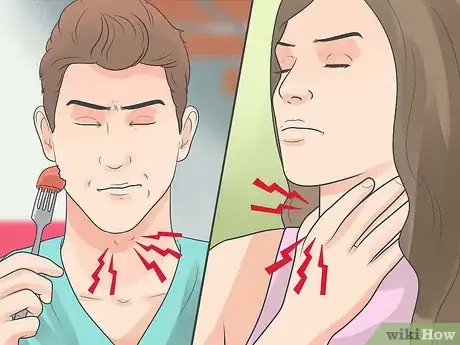

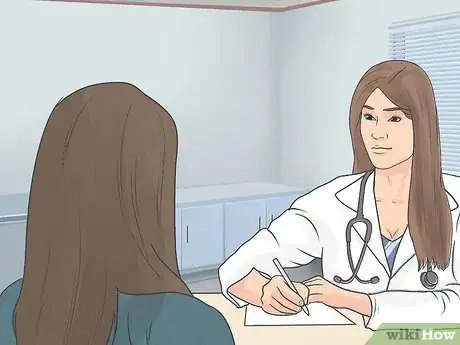
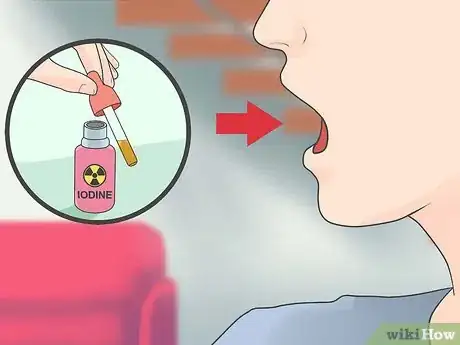
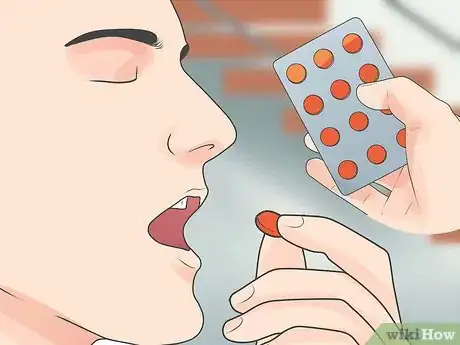
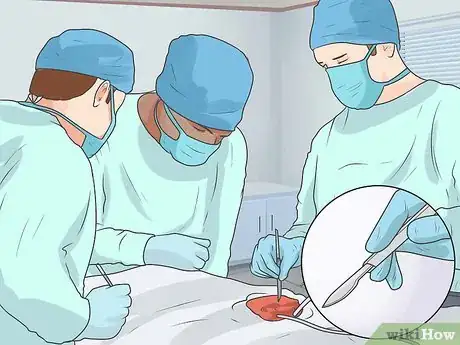



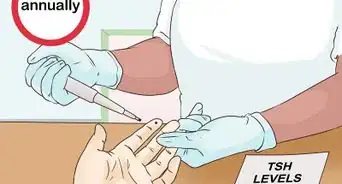








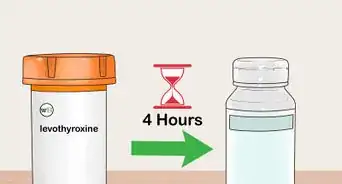

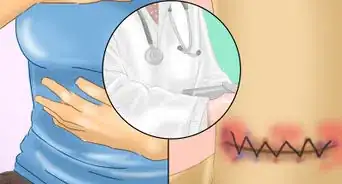
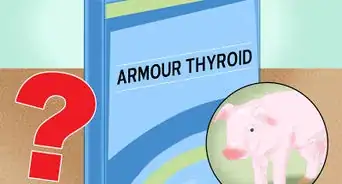










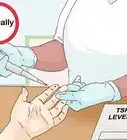

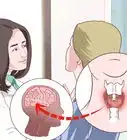




































Medical Disclaimer
The content of this article is not intended to be a substitute for professional medical advice, examination, diagnosis, or treatment. You should always contact your doctor or other qualified healthcare professional before starting, changing, or stopping any kind of health treatment.
Read More...